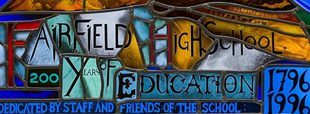Computer Science
Computing at Fairfield equips all pupils to use computational thinking and creativity to understand and change the world using technology. Pupils are taught the principles of information and computation, how digital systems work, and how to put this knowledge to use through programming. Computing enables all pupils to become increasingly independent users of technology in a safe and responsible way and develops digital literacy to allow our pupils to excel in a digital world. It enables pupils to gain a better understanding of how computing can help in all fields and develops their ability to judge when and how to use technology and where it has limitations. Computing develops critical thinking to encourage pupils to think about the quality and reliability of information. Pupils learn to solve problems and develop resilience to succeed.
Computing forms part of the National Curriculum and is offered to all Key Stage 3 and Key Stage 4 pupils. Computer Science is taught for an hour a week at KS3 with specialist computer Science Staff. At KS4 both options are taught with five hour a fortnight with specialist staff. All Computing lessons are taught in suites with machines for all pupils, specialist software and additional hardware like Micro Bits to ensure all pupils can program, code and develop computing skills.
The Computing Faculty is committed to developing and improving the Computing knowledge, skill and awareness for all students. We are constantly innovating and progressing in order to ensure pupils leave Fairfield with knowledge and skills at a level suitable for the future workplace and as active participants in a digital world. Our aim is to give all girls a high-quality computing education which equips them to understand and change the world through computational thinking. We hope to develop logical thinking and precision. Our curriculum teaches how digital systems work, how they are designed and programmed, and the fundamental principles of information and computation. Our curriculum also ensures that pupils become digitally literate – able to use, and express themselves through, information and communication technology.
Careers in Computer Science
“An outstanding quality of education.”

Fairfield High School for Girls
Fairfield Avenue, Droylsden, Manchester, M43 6AB Email: admin@fairfieldhighschool.co.uk Tel: 0161 370 1488
Fairfield Avenue, Droylsden, Manchester, M43 6AB Email: admin@fairfieldhighschool.co.uk Tel: 0161 370 1488
Fairfield High School for Girls is an Academy Trust. The Trust is a limited company registered in England and Wales. Company number 07511610, Data Protection Registration Number Z2574365.




